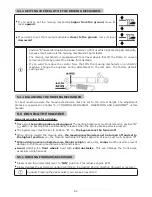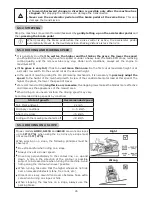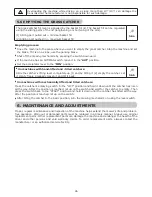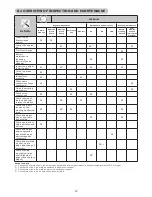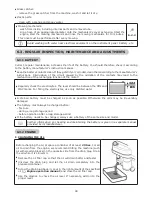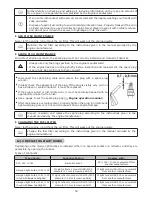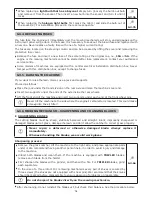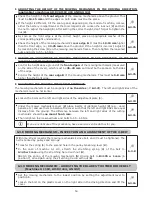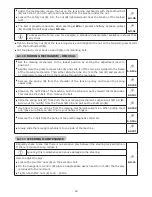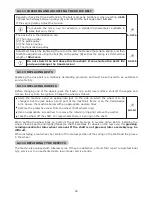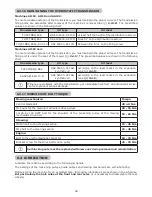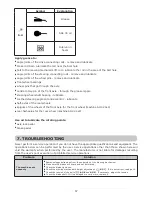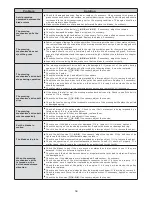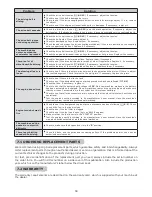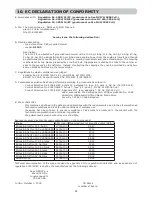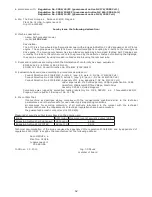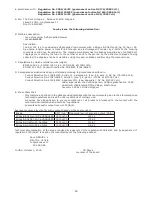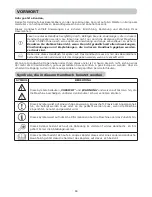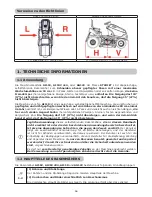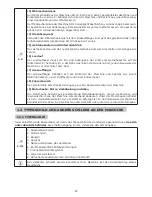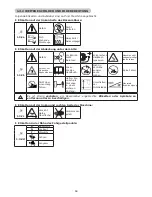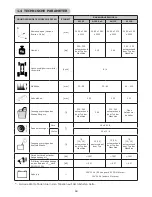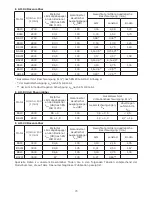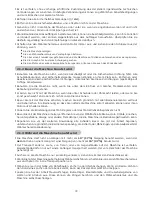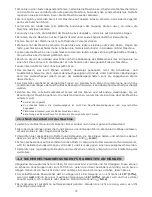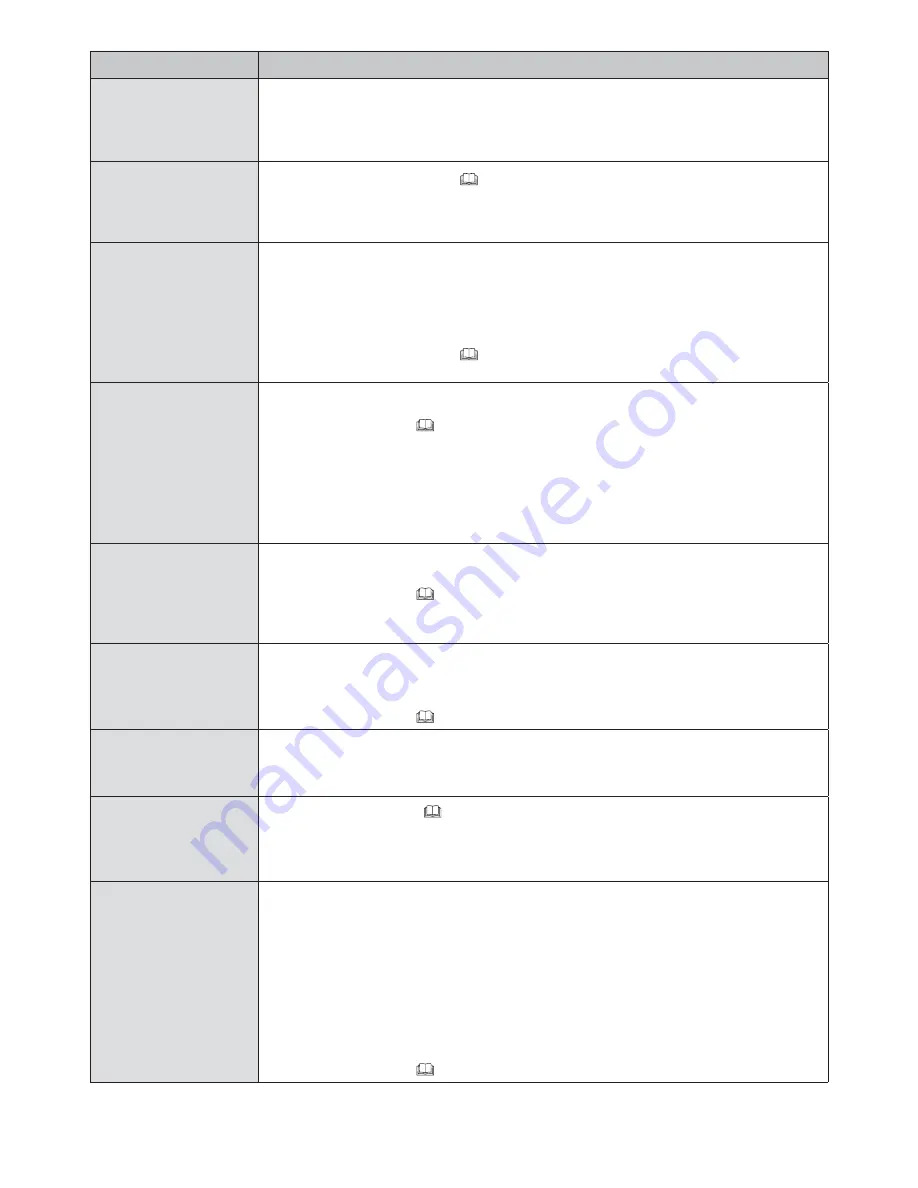
58
Problem
Solution
A strip remains
unmowed between the
blade rotors
Check for damaged bearings. Repair or replace, if necessary. When mowing thick grass or
grass with an excessively wet surface, an unmowed strip may remain.The driving speed should
correspond to the right transmission gear for the mowing conditions. The engine should run
with a completely open throttle.
Make sure the blades are sharp and not deformed. Replace the blades, if necessary.
The mowing
mechanism pulls the
turf
Check the tension of the belts (
6.3.8
and
6.3.9
). If necessary, adjust the tension.
Check for damaged bearings. Repair or replace, if necessary.
Check the mowing height and adjust it, if necessary. Turf is often pulled on uneven terrain.
Check to see if the blades are warped. Replace the blades, if necessary.
The mowing
mechanism does not
eject the grass
Remove clogged clippings from the underside of the mowing mechanism. Under wet conditions,
the removal tube and the underside of the mowing mechanism’s exit port can be clogged with
grass. Do not cut wet grass.
The driving speed should correspond to the right transmission gear for the mowing conditions.
The engine should run with a completely open throttle. When mowing tall grass, first mow
once at a high adjustment and then again at normal height. Abide by the information in chapter
5.5.3.
Check the tension of the belts (
6.3.8
and
6.3.9
). If necessary, adjust the tension.
Especially after replacing blades, make sure that the blade is installed correctly.
The mowing
mechanism’s drive belt
stops during operation
The mowing mechanism’s drive belt may be damaged if it jumps out of the pulley during
operation. If the belt still jumps out after trying the following steps, it must be replaced.
Check the belt tension (
6.3.8
). If necessary, adjust the tension.
Check the belt guide.
Check the mowing height, and adjust it if necessary.
Check to see if belt movement is being impeded by a foreign object. If it is, remove the object.
Double check all pulleys. A bent or broken pulley can cause problems. Replace it, if necessary.
Check the inner surface of the pulley on the engine. If it is rough or has cracks, the pulley
should be replaced.
Check for worn-out parts in the tensioning mechanism, and replace them if necessary.
The mowing
mechanism’s drive belt
slips
If the grass is too tall or wet, the mowing mechanism’s belt can slip. Check to see if the belt is
worn out. If it is, change it.
Check the belt tension (
6.3.8
). If necessary, adjust the tension.
Check the tension spring of the turnbuckle mechanism of the mowing belt.Replace the pulled
or damaged spring.
The mowing
mechanism’s drive belt
wears excessively
Check all areas of the pulley guide. Check to see if belt movement is being impeded by a
foreign object. If it is, remove the object.
Check the pulleys, and if they are damaged, replace them.
Check the mowing height, and adjust it if necessary.
Check the belt tension (
6.3.8
). If necessary, adjust the tension.
Set the blades in
motion
Check to see if the belt is worn out or damaged. If it is, replace it. If it is loose, tighten it.
Check the spring on the tensioning mechanism. Replace the broken or damaged spring.
Check to see if belt movement is being impeded by a foreign object. If it is, remove the object.
The blades stop late
Check the belt tension (
6.3.8
). If necessary, adjust the tension. If the belt cannot be
tightened further due to considerable wear, replace it.
Check to see if belt movement is being impeded by a foreign object. If it is, remove the object.
Check the operation of the electromagnetic connector to see if it shuts off properly. If it
malfunctions, have it repaired or replaced by an authorized service facility.
When the mowing
mechanism’s drive
is turned on, the
belt shows extreme
vibration
Check the blades to see if they are uneven or warped, and also check to see if they are
balanced. If they are deformed, replace them.
Check to see if the belt has burnt surfaces or irregularities that may lead to vibration. Replace
the damaged belt.
Check to see if the blades are worn or damaged. Replace them, if necessary.
Check the operation of the electromagnetic connector to see if it turns on properly. If it
malfunctions, have it repaired or replaced by an authorized service facility.
Check the inner surface of the pulley on the engine. If it is rough or has cracks, the pulley
should be replaced.
Check to see that no grass is lodged under the mowing mechanism. If there is any, remove it.
Check to make sure there is no defect in the engine mount. If necessary, tighten or replace
the bolts.
Check the belt tension (
6.3.8
). If necessary, adjust the tension.
Summary of Contents for EF106J Starjet
Page 2: ...2 1 2 1 3 1 1 3 2a ...
Page 3: ...3 1 3 2b 1 3 2c 1 3 2d ...
Page 4: ...4 3 1 3 3 1a 3 3 1b ...
Page 5: ...5 3 3 1c 3 3 1d 3 3 2a ...
Page 6: ...6 3 3 2b 3 3 2c 3 3 2d ...
Page 7: ...7 3 3 2e 3 3 2f 3 3 2g ...
Page 8: ...8 3 3 2h 3 3 2i ...
Page 9: ...9 3 3 2j 3 3 2k ...
Page 10: ...10 3 3 2l 3 3 2m 3 3 2n ...
Page 11: ...11 3 3 2o 3 4 5 ...
Page 12: ...12 3 4 6 4 1a ...
Page 13: ...13 4 1b 4 2 1a ...
Page 14: ...14 4 2 1b 5 6a 5 6b 6 2 2 ...
Page 15: ...15 6 3 3a 6 3 3b 6 3 6a 6 3 6b 6 3 7a ...
Page 16: ...16 6 3 7b 6 3 7c 6 3 7d ...
Page 17: ...17 6 3 7e 6 3 8 6 3 9a 6 3 9b ...
Page 18: ...18 6 3 9c 6 3 10a 6 3 10b 6 3 10c ...
Page 19: ...19 6 3 10d 6 3 10e 6 3 10f 6 3 11 ...
Page 20: ...20 6 3 12a 6 3 12b 6 3 14 ...
Page 21: ...21 6 4 ...
Page 341: ...341 ...
Page 342: ...342 ...
Page 343: ...343 ...

